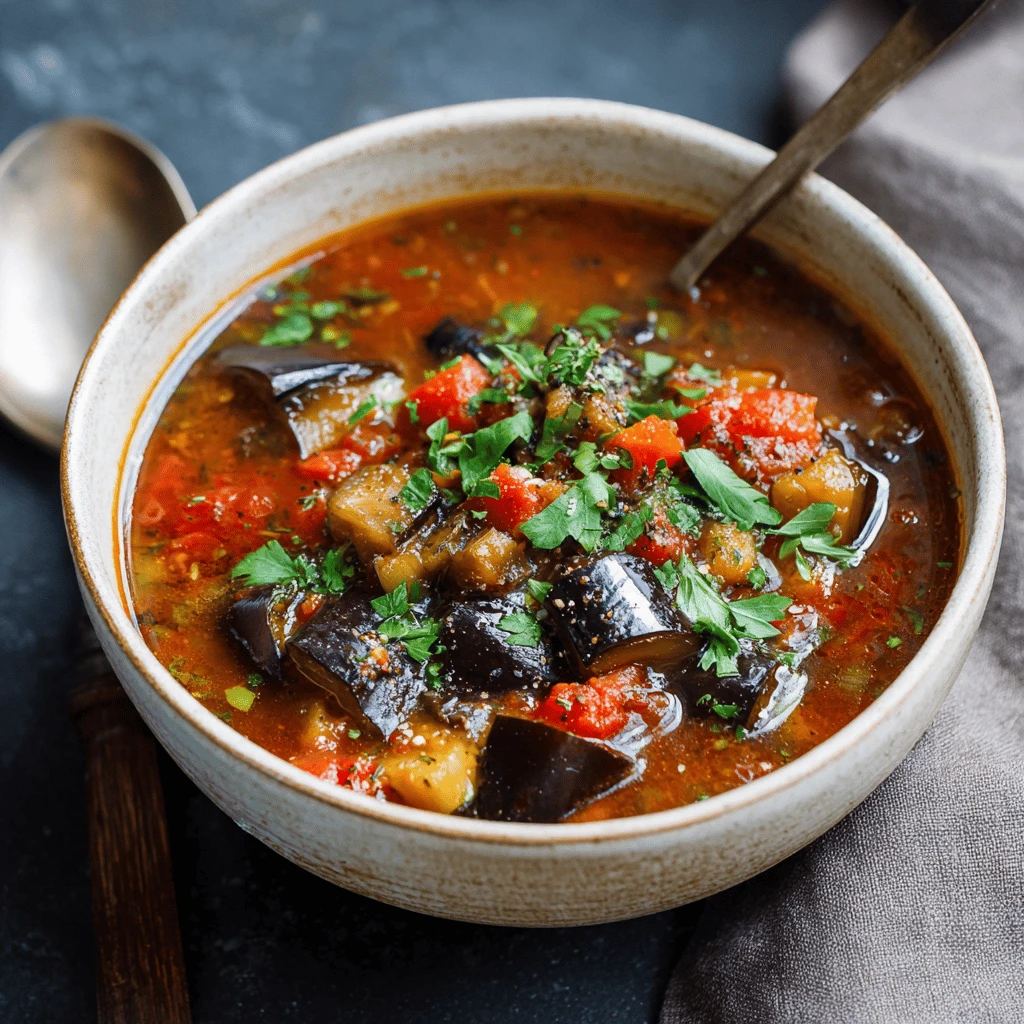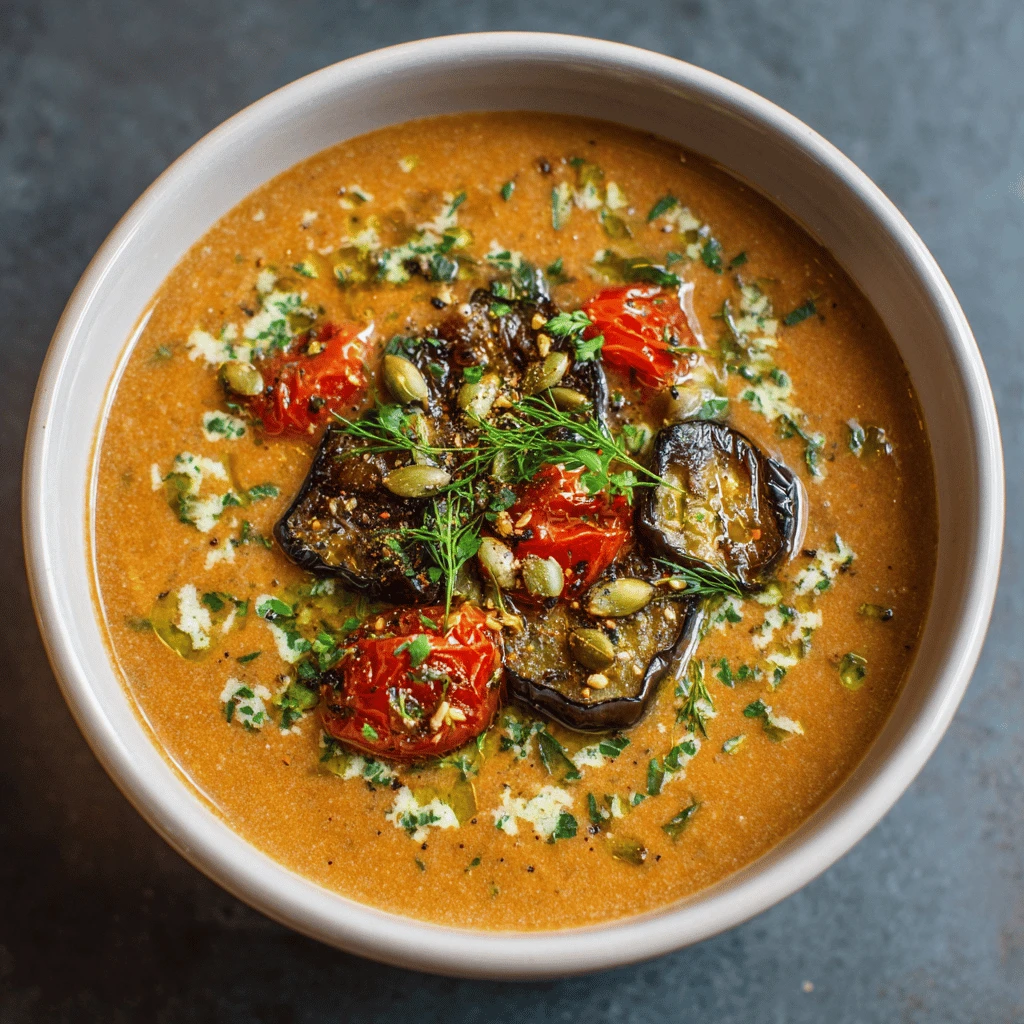Meal Prep Mediterranean Eggplant Soup
Mediterranean Eggplant Soup is a flavorful and healthy dish perfect for meal prepping. Packed with vibrant vegetables, aromatic herbs, and the unique texture of eggplant, this soup offers a delightful taste of the Mediterranean diet. This guide provides a comprehensive look at how to prepare, store, and enjoy this delicious and versatile soup.
Understanding the Mediterranean Diet & its Benefits
The Mediterranean diet, inspired by the traditional eating habits of people living in the regions bordering the Mediterranean Sea, is renowned for its health benefits. It emphasizes plant-based foods like vegetables, fruits, whole grains, legumes, and nuts. Olive oil is the primary source of fat, while fish and poultry are preferred over red meat.
Key benefits of the Mediterranean diet include:
- Heart Health: Rich in healthy fats and antioxidants, it promotes cardiovascular well-being.
- Weight Management: High in fiber and nutrients, it helps you feel full and satisfied, aiding in weight control.
- Brain Health: Research suggests it can improve cognitive function and reduce the risk of neurodegenerative diseases.
- Reduced Inflammation: Abundant in anti-inflammatory compounds, it may help alleviate symptoms of chronic diseases.
Incorporating Mediterranean Eggplant Soup into your meal prep routine is a delicious way to tap into these remarkable advantages. It’s a low-calorie, nutrient-dense option that perfectly complements a healthy lifestyle.
Crafting the Perfect Meal Prep Mediterranean Eggplant Soup
Creating a great Mediterranean Eggplant Soup starts with selecting fresh, high-quality ingredients. Here’s a breakdown of the key components and how to prepare them:
- Eggplant: Choose firm, heavy eggplants with smooth, unblemished skin. Roasting the eggplant before adding it to the soup enhances its flavor and texture. To roast, cube the eggplant, toss it with olive oil, salt, and pepper, and bake at 400°F (200°C) for 20-25 minutes, or until tender and slightly browned.
- Aromatic Base: Onions, garlic, and celery form the foundation of the soup’s flavor. Sauté them in olive oil until softened and fragrant. Adding a pinch of red pepper flakes introduces a subtle heat.
- Vegetables: Diced tomatoes (fresh or canned), bell peppers, zucchini, and carrots add color, texture, and essential nutrients.
- Broth: Vegetable broth provides a light and flavorful liquid base. Chicken broth can also be used for a richer flavor.
- Herbs & Spices: Dried oregano, basil, and thyme are classic Mediterranean herbs that enhance the soup’s aroma. Bay leaves add depth and complexity.
- Finishing Touches: A squeeze of lemon juice brightens the flavors and a drizzle of extra virgin olive oil adds richness. Fresh parsley or basil can be used as a garnish.
Recipe Outline:
1. Roast the Eggplant: Prepare and roast the eggplant as described above.
2. Sauté Aromatics: In a large pot or Dutch oven, sauté onions, garlic, and celery in olive oil until softened.
3. Add Vegetables: Add the remaining vegetables (tomatoes, bell peppers, zucchini, carrots) and cook for 5-7 minutes, until slightly softened.
4. Incorporate Broth & Seasonings: Pour in the broth, add the dried herbs, bay leaves, salt, and pepper. Bring to a boil, then reduce heat and simmer for 20-25 minutes.
5. Blend (Optional): For a smoother consistency, use an immersion blender to partially blend the soup.
6. Add Roasted Eggplant: Stir in the roasted eggplant and simmer for another 5-10 minutes to allow the flavors to meld.
7. Finish & Serve: Remove bay leaves. Stir in lemon juice and drizzle with olive oil. Garnish with fresh parsley or basil.
Meal Prep Strategies: Maximizing Flavor and Freshness
Proper meal prep techniques are crucial for maintaining the soup’s flavor and nutritional value. Here are some best practices:
-
- Cool Completely: Allow the soup to cool completely before portioning and storing. This prevents condensation from forming, which can affect the soup’s texture and promote bacterial growth.
- Portioning: Divide the soup into individual servings in airtight containers. Consider using glass containers for better durability and to avoid plastic odors.
- Storage:
Refrigeration: Store the soup in the refrigerator for up to 5 days.
Freezing: For longer storage, freeze the soup for up to 2-3 months. Thaw overnight in the refrigerator before reheating. Note that the texture of the eggplant may change slightly after freezing.
- Reheating: Reheat the soup on the stovetop over medium heat or in the microwave. Add a splash of broth or water if needed to thin it out.
- Enhancing Flavor Upon Reheating: A drizzle of fresh olive oil, a squeeze of lemon juice, or a sprinkle of fresh herbs can revive the soup’s flavors after reheating.
Tips for Maintaining Texture: To avoid the soup becoming overly mushy during reheating, consider slightly undercooking the vegetables during the initial cooking process. They will continue to soften as the soup sits.
Variations and Customization: Tailoring the Soup to Your Taste
One of the best things about Mediterranean Eggplant Soup is its adaptability. Here are several ways to customize the recipe to suit your preferences and dietary needs:
- Protein Boost: Add cooked chickpeas, lentils, or white beans for a heartier and more protein-rich soup. Grilled chicken or shrimp can also be added.
- Spicy Kick: Increase the amount of red pepper flakes or add a pinch of cayenne pepper for a spicier soup.
- Smoked Flavor: Incorporate smoked paprika or smoked sea salt for a smoky depth of flavor.
- Creamy Texture: Add a swirl of coconut milk or Greek yogurt (dairy or non-dairy) for a creamier texture. Be sure to add it after reheating, as the dairy based yogurt may curdle.
- Vegan Option: Ensure the vegetable broth is vegan-friendly. Omit any non-vegan garnishes.
- Low-Carb Option: Reduce the amount of carrots and tomatoes, and add more non-starchy vegetables like spinach or kale.
- Adding Grains: Consider adding orzo or small pasta shapes near the end of cooking for a heartier meal. Adjust cooking time accordingly.
- Different Types of Eggplant: Try different types of eggplant for varying textures and tastes, such as Japanese eggplant (long and slender) or Italian eggplant (rounder shape).
Addressing Common Questions About Mediterranean Eggplant Soup
Here are some frequently asked questions about making and storing Mediterranean Eggplant Soup:
Q: How do I prevent eggplant from being bitter?
A: Salting the eggplant before cooking can help draw out excess moisture and reduce bitterness. Cut the eggplant into cubes, place them in a colander, sprinkle with salt, and let them sit for 30 minutes. Rinse and pat dry before roasting.
Q: Can I make this soup in a slow cooker?
A: Yes, you can adapt this recipe for a slow cooker. Sauté the aromatics and vegetables as directed, then transfer them to the slow cooker with the broth, seasonings, and roasted eggplant. Cook on low for 6-8 hours or on high for 3-4 hours.
Q: How long does Mediterranean Eggplant Soup last in the freezer?
A: Properly stored in an airtight container, Mediterranean Eggplant Soup can last for up to 2-3 months in the freezer.
Q: Can I use other vegetables in this soup?
A: Absolutely! Feel free to experiment with other vegetables like spinach, kale, Swiss chard, or sweet potatoes. Adjust the cooking time as needed.
Q: Is this soup suitable for a gluten-free diet?
A: Yes, this soup is naturally gluten-free, as long as you use gluten-free broth.
Q: What can I serve with Mediterranean Eggplant Soup?
A: Serve it with crusty bread, a side salad, or a dollop of Greek yogurt or cream (if not vegan). A sprinkle of feta cheese (if not vegan) also enhances the flavor.




